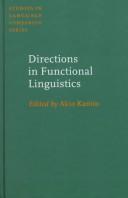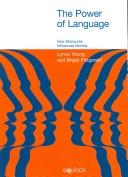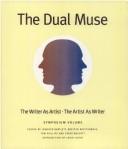| Listing 1 - 10 of 123 | << page >> |
Sort by
|
Book

ISBN: 3110882272 9783110882278 Year: 2017 Publisher: Berlin Boston
Abstract | Keywords | Export | Availability | Bookmark
 Loading...
Loading...Choose an application
- Reference Manager
- EndNote
- RefWorks (Direct export to RefWorks)
Book
ISBN: 1282873970 9786612873973 1441133178 9781441133175 9781282873971 9780826494474 0826494471 9780826494481 082649448X Year: 2009 Publisher: London New York, NY Continuum
Abstract | Keywords | Export | Availability | Bookmark
 Loading...
Loading...Choose an application
- Reference Manager
- EndNote
- RefWorks (Direct export to RefWorks)
The Continuum Companion to Systemic Functional Linguistics is designed to be the essential one-volume resource for students and researchers. The book includes: introduction to the field by M A K Halliday; comprehensive introduction to methodology and issues; definitions of key terms; outlines of research areas; guide to researching systemic functional linguistics; bibliography of key readings. Comprehensive and accessible, this Continuum Companion will be the essential guide for students and researchers of systemic functional linguistics.
Book
ISBN: 1282750313 9786612750311 9882205437 9789882205437 9789622099647 9622099645 Year: 2009 Publisher: Hong Kong Hong Kong University Press
Abstract | Keywords | Export | Availability | Bookmark
 Loading...
Loading...Choose an application
- Reference Manager
- EndNote
- RefWorks (Direct export to RefWorks)
This volume covers a wide range of theoretical and methodological issues pertaining to Chinese functional linguistic studies. The nine articles included in this collection offers genuine explanations for grammatical elements either important in Chinese grammar or unique cross-linguistically.

ISBN: 9027230390 9789027230393 1556198477 9781556198472 9789027281944 9027281947 128328037X 9786613280374 Year: 1997 Volume: 36 Publisher: Amsterdam Benjamins
Abstract | Keywords | Export | Availability | Bookmark
 Loading...
Loading...Choose an application
- Reference Manager
- EndNote
- RefWorks (Direct export to RefWorks)
Functional linguistics is concerned with the function of language and considers it an essense of human language. Views like this is not particularly new, but rather traditional in the history of linguistics. But today functional linguistics is constituted by a wide range of theoretical and methodological concerns. What unifies them as functional is the concern with discourse. This is quite natural since language can only function in discourse, not as isolated sentences.This collection of papers reflects some of the major approaches and methodologies in contemporary functional linguistics
Functionalism (Linguistics) --- Congresses. --- Grammar --- Pragmatics --- -Congresses --- Congresses
Book
Year: 2014 Publisher: Berlin, Germany : Language Science Press,
Abstract | Keywords | Export | Availability | Bookmark
 Loading...
Loading...Choose an application
- Reference Manager
- EndNote
- RefWorks (Direct export to RefWorks)
Case-systems all over the world exhibit striking similarities. In most lan- guages intransitive subjects (S) receives less overt marking than one of the two transitive arguments (agent-like A or patient-like P); the other one of these two arguments is usually encoded by the same form as S. In some languages the amount of overt marking is identical between S, A, and P. But hardly ever does the S argument receive more overt marking than A or P. Yet there are some languages that do not follow this general pattern. This book is about those languages that behave differently, the marked-S languages. Marked-S languages are well-known to be found in East Africa, where they occur in two different language families, Afro-Asiatic and Nilo-Sa- haran. They can also be found in North-Western America and the Pacific region. This book is the first investigation of marked S-languages that treats the phenomenon on a global scale. The study examines the functional distribution of the two main case- forms, the form used for S (S-case) and the case-form of the transitive ar- gument which receives less marking (the zero-case). It offers a very fine- grained perspective considering a wide range of constructions. The con- texts in which the case-marking patterns are investigated include nom- inal, existential and locational predication, subjects in special discourse function (e. g. focused constituents), subjects of passives and dependent clauses, as well as the forms used for addressing someone (vocative form) and for using a noun in isolation (citation form). Apart from the functional distribution of case forms, the formal means of marking are also considered. The main focus is on the synchronic de- scription and comparison of marked-S languages, but historical explana- tions for the unusual case-marking pattern are also discussed.
Functionalism (Linguistics) --- Grammar, Comparative and general --- Case.

ISBN: 1845535677 9781845535674 9781845530150 1845530152 1845530144 9781845530143 Year: 2006 Publisher: London Equinox Pub.
Abstract | Keywords | Export | Availability | Bookmark
 Loading...
Loading...Choose an application
- Reference Manager
- EndNote
- RefWorks (Direct export to RefWorks)
The Power of Language: How Discourse Influences Society is designed to introduce students at the tertiary level to both Systemic Functional Linguistics and Critical Discourse Analysis.
Discourse analysis --- Functionalism (Linguistics) --- Social aspects.
Periodical
Year: 2014 Publisher: Heidelberg, Germany : Springer-Verlag, GmbH,
Abstract | Keywords | Export | Availability | Bookmark
 Loading...
Loading...Choose an application
- Reference Manager
- EndNote
- RefWorks (Direct export to RefWorks)
"Functional Linguistics publishes scholarly articles and reviews in the broad area of functional studies, with a special focus on systemic functional linguistics. The journal aims to provide a platform for the exploration of language and linguistic issues from a functional and meaning-oriented perspective. Areas to be covered in this journal include: language and context, functional grammar, semantic variation, discourse analysis, multimodality, register and genre analysis, educational linguistics, etc."
Functionalism (Linguistics) --- Systemic grammar --- Philology & Linguistics

ISBN: 1556199279 1556199287 9027230447 9027230455 9781556199271 9781556199288 9789027230447 9789027230454 9786612163012 1282163019 9027298785 9786612163029 1282163027 9027298793 9789027298799 9781282163027 9789027298782 9781282163010 Year: 1999 Volume: 41-42 Publisher: Amsterdam Philadelphia J. Benjamins
Abstract | Keywords | Export | Availability | Bookmark
 Loading...
Loading...Choose an application
- Reference Manager
- EndNote
- RefWorks (Direct export to RefWorks)
The 23rd UWM Linguistics Symposium (1996) brought together linguists of opposing theoretical approaches - functionalists and formalists - in order to determine to what extent these approaches really differ from each other and to what extent the approaches complement each other. The two volumes of Functionalism and Formalism in Linguistics contain a careful selection of the papers originally presented at the symposium. Volume I includes papers discussing the two basic approaches to linguistics; with contributions by: Werner Abraham, Stephen R. Anderson, Joan L. Bybee, William Croft, Alic
Fonctionnalisme (Linguistique) --- Formalisation (Linguistique) --- Formalisme. --- Formalization (Linguistics) --- Formalization (Linguistics). --- Functionalism (Linguistics) --- Functionalism (Linguistics). --- Functionalisme. --- Congresses --- Formalization (Linguistics) -- Congresses. --- Functionalism (Linguistics) -- Congresses. --- Linguistics. --- Languages & Literatures --- Philology & Linguistics
Book
ISSN: 01657763 ISBN: 9027271585 9789027271587 1299794750 9781299794757 9789027206046 902720604X Year: 2013 Volume: v. 137 Publisher: Amsterdam John Benjamins Pub. Company
Abstract | Keywords | Export | Availability | Bookmark
 Loading...
Loading...Choose an application
- Reference Manager
- EndNote
- RefWorks (Direct export to RefWorks)
The theory of FDG claims that deontic modality can be either participant-oriented or event-oriented, both distinctions forming part of the Representational Level. However, there is evidence from Spanish and a number of other languages that event-oriented deontic modality can be coded twice, with different values in one and the same State-of-Affairs. We will therefore distinguish between objective and subjective deontic modality, where the latter has scope over the former. On the basis of the ways in which the expressions of subjective and objective deontic modality interact with tense and othe
Functional discourse grammar. --- Functional grammar --- Discourse analysis --- Functionalism (Linguistics)
Book
Year: 2018 Publisher: Amsterdam, [Netherlands] ; Philadelphia, [Pennsylvania] : John Benjamins Publishing Company,
Abstract | Keywords | Export | Availability | Bookmark
 Loading...
Loading...Choose an application
- Reference Manager
- EndNote
- RefWorks (Direct export to RefWorks)
Functionalism (Linguistics) --- Grammar, Comparative and general --- Discourse analysis. --- Usage. --- Syntax.
| Listing 1 - 10 of 123 | << page >> |
Sort by
|

 Search
Search Feedback
Feedback About UniCat
About UniCat  Help
Help News
News